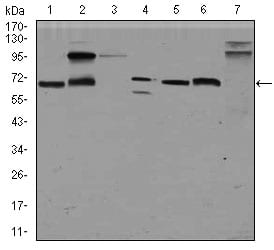
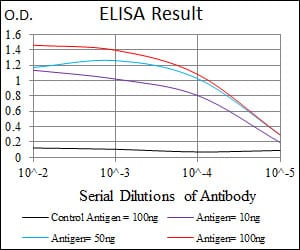
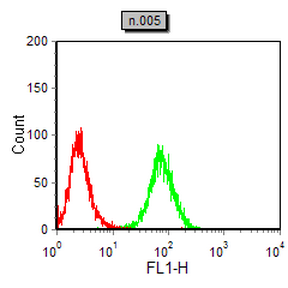
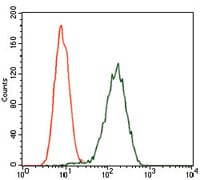
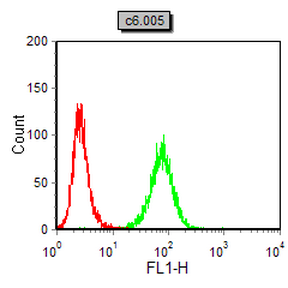
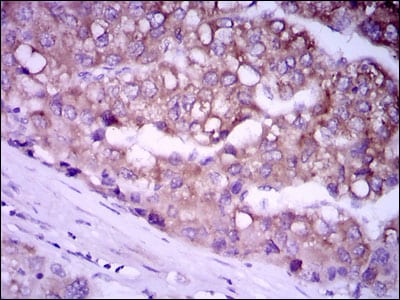
| WB | 1/500 - 1/2000 | Human,Mouse,Rat |
| IF | 咨询技术 | Human,Mouse,Rat |
| IHC | 1/200 - 1/1000 | Human,Mouse,Rat |
| ICC | 技术咨询 | Human,Mouse,Rat |
| FCM | 1/200 - 1/400 | Human,Mouse,Rat |
| Elisa | 1/10000 | Human,Mouse,Rat |
| Aliases | SGB; DGSX; MXR7; SDYS; SGBS; OCI-5; SGBS1; GTR2-2 |
| Entrez GeneID | 2719 |
| clone | 9C2 |
| WB Predicted band size | 65.5kDa |
| Host/Isotype | Mouse IgG1 |
| Antibody Type | Primary antibody |
| Storage | Store at 4°C short term. Aliquot and store at -20°C long term. Avoid freeze/thaw cycles. |
| Species Reactivity | Human,Mouse,Rat |
| Immunogen | Purified recombinant fragment of human GPC3 expressed in E. Coli. |
| Formulation | Purified antibody in PBS with 0.05% sodium azide |
+ +
以下是3篇关于GPC3抗体的参考文献概览(信息基于公开研究数据整理,具体文献请核实原文):
---
1. **文献名称**:"A human single-domain antibody elicits potent antitumor activity by targeting an epitope in mesothelin and glypican-3"
**作者**:Yamaguchi T, et al.
**摘要**:报道了一种靶向GPC3和间皮素的双特异性单域抗体(HN3),通过阻断Wnt/YAP信号通路抑制肿瘤生长,并在肝癌小鼠模型中显示出显著抗肿瘤效果。
2. **文献名称**:"ImmunoPET imaging of glypican-3 in hepatocellular carcinoma with 89Zr-labeled antibodies"
**作者**:Fernandez A, et al.
**摘要**:研究利用锆-89标记的GPC3抗体进行免疫PET成像,证明其在肝细胞癌小鼠模型中可高灵敏度检测肿瘤,为临床无创诊断提供了潜在工具。
3. **文献名称**:"Chimeric antigen receptor T cells targeting glypican-3 suppress hepatocellular carcinoma growth"
**作者**:Gao H, et al.
**摘要**:开发了靶向GPC3的CAR-T细胞疗法,体外和体内实验显示其能特异性识别并杀伤GPC3阳性肝癌细胞,且在小鼠模型中显著抑制肿瘤进展。
4. **文献名称**:"GPC3 antibody-drug conjugate exhibits potent antitumor activity against hepatocellular carcinoma"
**作者**:Li W, et al.
**摘要**:构建了GPC3抗体-药物偶联物(ADC),通过靶向递送细胞毒性药物,在多种肝癌模型中有效诱导肿瘤细胞凋亡,并与索拉非尼联用增强疗效。
---
建议通过PubMed或Web of Science检索具体文献以获取完整信息。
The glypican-3 (GPC3) antibody targets GPC3. a cell surface heparan sulfate proteoglycan anchored to the plasma membrane. GPC3 is part of the glypican family, which regulates cellular signaling pathways (e.g., Wnt, Hedgehog, YAP) during embryonic development. While minimally expressed in healthy adult tissues, GPC3 is overexpressed in several cancers, particularly hepatocellular carcinoma (HCC), malignant melanoma, and ovarian cancer, making it a promising tumor biomarker and therapeutic target.
GPC3 antibodies have emerged as critical tools in cancer diagnostics and therapy. In diagnostics, they enable immunohistochemical detection of GPC3 in tumor biopsies or liquid biopsies, aiding HCC differentiation from benign liver conditions. Therapeutically, GPC3 antibodies are engineered into antibody-drug conjugates (ADCs), bispecific antibodies, or CAR-T cell therapies. For instance, codrituzumab (an anti-GPC3 monoclonal antibody) and YP7 (an ADC) have shown preclinical efficacy by delivering cytotoxic agents directly to GPC3-positive tumors. CAR-T cells targeting GPC3 have demonstrated antitumor activity in early-phase clinical trials for HCC.
Challenges include tumor heterogeneity in GPC3 expression and potential off-target effects. Ongoing research focuses on optimizing antibody affinity, developing combination therapies (e.g., with immune checkpoint inhibitors), and exploring novel formats like nanobodies to enhance tumor penetration. Overall, GPC3 antibodies represent a versatile platform for precision oncology, with continued advancements expected to improve cancer detection and treatment outcomes.
×